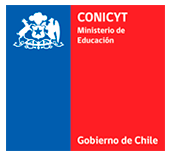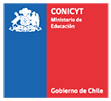Fondap Program
Since its establishment in 1997, the Fund for Research Centers in Prioritary Areas, FONDAP, has financed 15 centers in very different areas, such as mathematics, oceanography, astronomy, and geothermia. For the latest competitive call, six areas were defined as issues of country–wide interest: sustainable agriculture and/or aquaculture; climate change; sustainable urban development, natural disasters, solar energy, and indigenous people.
Director: María Eugenia Camelio
Budget 2013: USD 21,4 millon
Line of Action: Establishing or strengthening Centers of Excellence to operate for a period of 10 years. This is achieved by Generating high–impact scientific research of excellence, based on the articulation of multidisciplinary groups of researchers who can demonstrate their productivity in areas where basic national science has reached a high level of development. Other goals of the FONDAP centers are the formation of advanced human capital, the establishment of national and international cooperation networks, and the dissemination of research results to the scientific community and the rest of society.
Funding Instruments
- National Competition for Research Centers of Excellence. In its four editions, it has supported 15 centers that work for periods of 10 years.
- The first competition supported three initiatives that have already been implemented: the centers for Interdisciplinary Advanced Research in Materials Science (CIMAT), for Cellular Regulation and Pathology (CRCP), and for Mathematical Modeling (CMM).
- The second competitive call added four centers: for Advanced Studies in Ecology and Biodiversity (CASEB), for Oceanographic Research in the Eastern South Pacific (COPAS), for Astrophysics (CENASTRO), and for Molecular Cell Studies (CEMC).
- The third competitive call awarded resources for two centers in late 2010: for Genoma Regulation (CRG), and for Excellence in Geothermia in the Andes (CEGA).
Since their establishment, the nine centers of excellence have produced more than 4,350 indexed publications; over 520 young researchers have obtained their PhD, and more than 315 have obtained their Master’s degree. Close to 435 post–doctoral professionals have participated in the Centers research programs.
Main Achievements in 2012
In 2012, the “Fourth National Competitive Call for Research Centers of Excellence in Priority Areas – FONDAP 2011”, awarded resources for six new centers. These centers are significant because they fall within the areas that have been defined as priorities of nationwide interest:
- Multidisciplinary Center for Intercultural and Indigenous Studies (ICIIS), Pontificia Universidad Católica de Chile (2012–2017).
- Center for Climate Science and Resilience (RC)2, Universidad de Chile (2012–2017).
- National Research Center for the Integrated Management of Natural Disasters (RCINDIM), Pontificia Universidad Católica de Chile (2012–2017).
- Center for Solar Energy Research (SERC–Chile), Universidad de Chile (2012–2017).
- Center for Sustainable Urban Development (CEDEUS), Pontificia Universidad Católica de Chile (2012–2017).
- Interdisciplinary Center for Sustainable Aquaculture Research (INCAR), Universidad de Concepción (2012–2017).
Higher Council for Science 2012
President
- María Loreto Martínez
Advisors
- René Garreaud
- Ariel Orellana
- Carlos Saavedra
- Alicia Salomone
- José Zagal
Higher Council for Technological Development 2012
President
- José Miguel Aguilera
Advisors
- Luis Michea
- Gonzalo Navarro
- Alejandro del Pozo


